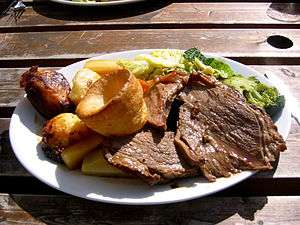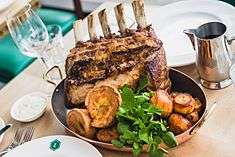Sunday roast

The Sunday roast is a traditional British main meal that is traditionally served on Sunday, consisting of roasted meat, roast potato, and accompaniments such as Yorkshire pudding, stuffing, vegetables and gravy. Vegetables such as roast parsnips, Brussels sprouts, peas, carrots, runner beans, broccoli are included and can be cooked in different styles; for example, cauliflower or leeks accompanied by a cheddar cheese sauce are popular, in addition to gravy.
Its prominence in British culture is such that in a UK poll it was ranked second in a list of things people love about Britain.[1] Other names for this meal are Sunday dinner, Sunday lunch, roast dinner, and Sunday joint (joint referring specifically to the joint of meat). The meal is often comparable to a less grand version of a traditional Christmas dinner. Besides being served in its original homelands, the tradition of a Sunday dinner has been a major influence on food cultures in countries with populations originating from the nations of the British Isles.
Origin
The Sunday Roast originated in England, United Kingdom as a meal to be eaten after church on Sunday. Eating a large meal following church services is common to all of the continent of Europe as with other Christian countries, but the Sunday Roast variant of this meal is uniquely British. On Sundays, all types of meat and dairy produce are allowed to be eaten, unlike on Fridays where many Roman Catholics and Anglicans traditionally abstain from eating meats, so ate fish instead. Likewise, it is traditional for Anglicans and English Catholics to fast before Sunday services, with a larger meal to break the fast afterwards. These religious rules created several traditional dishes in the United Kingdom.
- Only eating fish on Friday resulted in a British tradition of 'fish Fridays' which is still common in fish and chip shops and restaurants across the United Kingdom on Fridays, particularly at Easter.
- Fasting before church in Britain and the 'breaking' of that 'fast' afterwards created the British tradition of breakfast which later evolved in to the full breakfast
- To mark the end of not being able to eat meat the Sunday Roast was created as a mark of celebration.
There are two historical points on the origins of the modern Sunday roast. In the late 1700s during the industrial revolution in the United Kingdom, families would place a cut of meat in to the oven as they got ready for church. They would then add in vegetables such as potatoes, turnips and parsnips before going to church on a Sunday morning. When they returned from the church the dinner was all but ready. The juices from the meat and vegetables were used to make a stock or gravy to pour on top of the dinner.[2] The second opinion holds that the Sunday roast dates back to medieval times, when the village serfs served the squire for six days a week. Then, on the Sunday, after the morning church service, serfs would assemble in a field and practise their battle techniques and were rewarded with a feast of oxen roasted on a spit.[3]
Typical elements
Meat


Typical meats used for a Sunday roast are roast beef, chicken, lamb or pork, although seasonally duck, goose, gammon, turkey or (rarely) other game birds may be used. [4]
Vegetables
Sunday roasts can be served with a range of boiled, steamed and/or roasted vegetables. The vegetables served vary seasonally and regionally, but will usually include roast potatoes, roasted in meat dripping or vegetable oil, and also gravy made from juices released by the roasting meat, perhaps supplemented by one or more stock cubes, gravy browning/thickening, roux or corn flour.
The potatoes can be cooked around the meat itself, absorbing the juices and fat directly (as in a traditional Cornish under-roast).[5] However, many cooks prefer to cook the potatoes and the Yorkshire pudding in a hotter oven than that used for the joint and so remove the meat beforehand to rest and "settle" in a warm place.[6]
Other vegetable dishes served with roast dinner can include mashed swede or turnip, roast parsnip, boiled or steamed cabbage, broccoli, green beans and boiled carrots and peas. It is also not uncommon for leftover composite vegetable dishes – such as cauliflower cheese and stewed red cabbage — to be served alongside the more usual assortment of plainly cooked seasonal vegetables.
Accompaniments
Common traditional accompaniments include:
- beef — Yorkshire pudding, suet pudding; English mustard, or horseradish sauce.
- pork — crackling and sage-and-onion stuffing; apple sauce or English mustard.
- lamb — mint sauce or jelly or redcurrant jelly.
- chicken — pigs in blankets, sausages or sausage meat, stuffing, bread sauce, apple sauce, cranberry sauce or redcurrant jelly.[7]
Left-overs
Left-over food from the Sunday roast has traditionally formed the basis of meals served on other days of the week. For example, meats might be used as sandwich fillings, roast beef may be chopped up with leftover roasted potatoes and some additional onion and then fried in a pan with a bit of oil and desired seasonings until somewhat crispy to make roast beef hash, lamb might be used in the filling for a shepherd's pie, and vegetables might form the basis for bubble and squeak.
In pubs and restaurants
In the UK, many pubs serving food have a Sunday menu that features a Sunday roast, usually with a variety of meats and often a vegetarian option, such as a nut roast. This is often cheaper than the normal menu, which may or may not be available on Sundays.
See also
| Wikimedia Commons has media related to Sunday roast. |
References
- ↑ "Bacon butties, roast dinners and a cuppa: 50 things we love best about Britain show we're a nation of food lovers". Daily Mail. Retrieved 3 November 2016
- ↑ Hill, Amelia (19 August 2007). "How Friday saved the Sunday roast". The Guardian. London.
- ↑ "British Food – British culture, customs and traditions". Learnenglish.de. 13 March 2000. Retrieved 29 June 2013.
- ↑ Classic Roast Dinner
- ↑ Amanda Persey (1 May 1993). Favourite Cornish Recipes. J. Salmon. ISBN 978-0-906198-97-1. Retrieved 30 January 2011.
- ↑ Delia Smith (1992). Delia Smith's complete cookery course. BBC Books. ISBN 978-0-563-36249-4. Retrieved 30 January 2011.
- ↑ Various roast dinner recipes from uktv